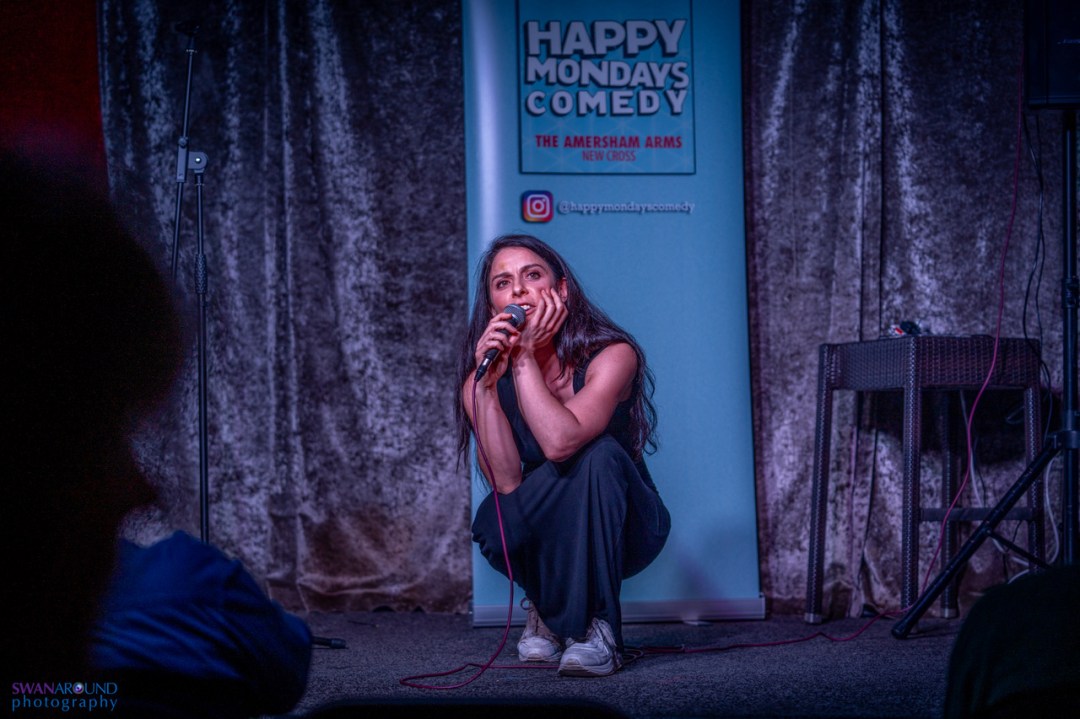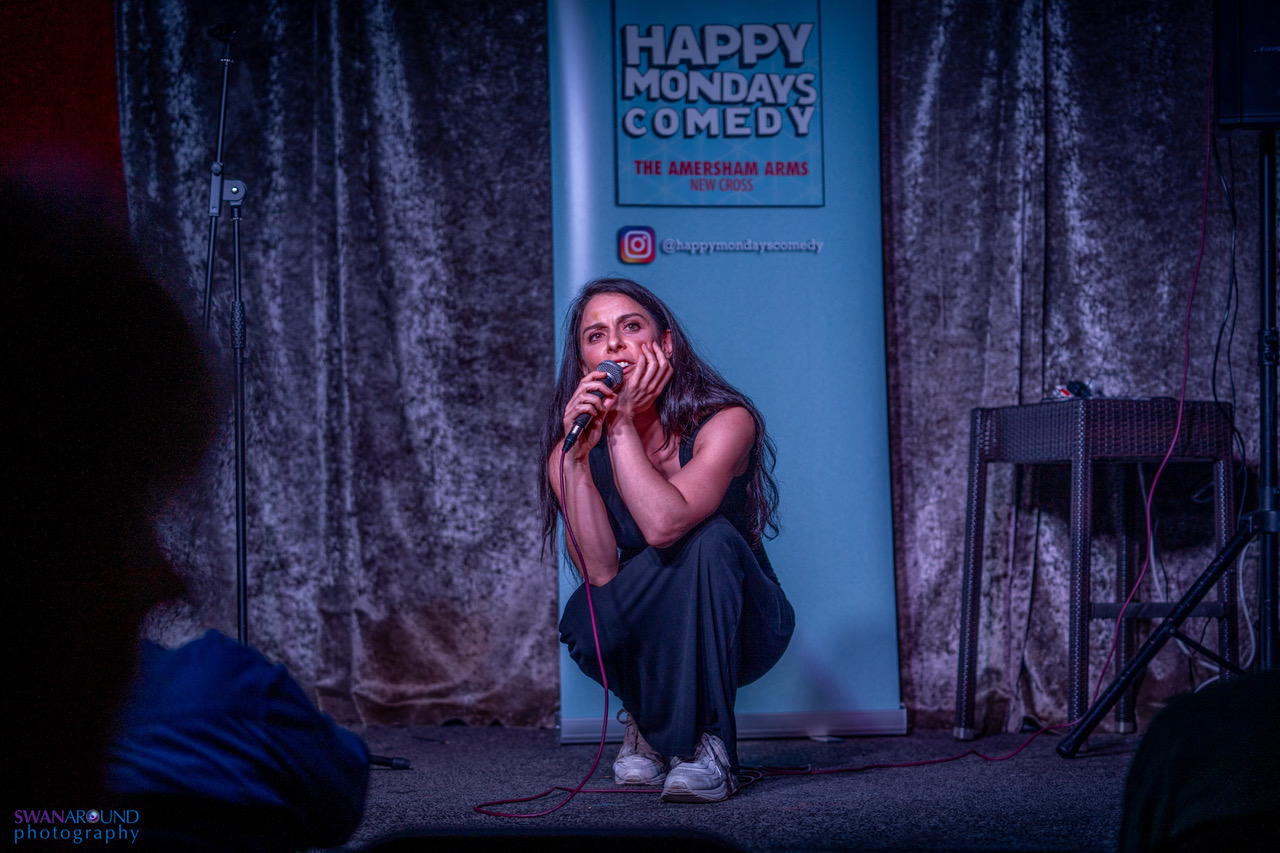In a small, dark room in the depths of Banshee Labyrinth, a gothic-looking venue just off Cowgate in Edinburgh, 11 people cheer and clap as I thank them profusely for spending the past hour with me. My backdrop is a red and white no-smoking sign and two coffin-shaped blackboards with drinks offers scrawled on them in chalk, and the portcullis-style door offers little soundproofing from inquisitive festivalgoers peering in and wondering aloud whether to take one of the 40 seats – but the setting is perfect for my first ever Edinburgh Fringe show.
As soon as I finish the last song and receive warm applause, I switch almost immediately from an empowered 38-year-old woman who’s just belted out 4 Non Blondes to a timid toddler grinning awkwardly and staring at her feet – an image perhaps compounded by my final outfit choice of flowery dungarees. That’s because I still question, deep down, whether I should be on the stage at all, or whether this all counts as sinfully drawing attention to myself.
Brought up a practising, headscarf-wearing Muslim with an Iranian father and English convert mother, I was raised to believe two fundamental truths about myself: firstly, that I was ‘too loud’, and secondly, that I shouldn’t sing on stage.
Ours was far from a quiet, music-free household, though. My older brother would blast drum and bass music, Mum would play Deep Purple and Led Zeppelin on car journeys, and every Sunday I’d record the Top 40 on to cassette to play back and write down the lyrics, burning into memory hits from B*witched, Boyzone and Tupac.
But there were lines I wasn’t allowed to cross. I was 11 when my dad told me that singing in public was forbidden for women in Islam, and I was 17 when, having found out that I’d been performing at school, he told me I was on ‘the wrong path’. Even if you think you’re happy, he warned, you’ll never be happy.
My teenage diaries are full of self-admonishments for being too loud, sharing too much with people and talking to boys, and I told myself daily to ‘be more feminine’. The messages from home, society and my own religious ideas were clear, and I carried within me a fundamental conflict between the expressive woman I was and the quiet woman I thought I should be.
As a young Muslim, a future as a singer was firmly out of the question. But even when I left home and lost my faith, I remained in the habit of distrusting my own feelings and questioning their value. That mindset has proved more difficult to break than my father’s rules.
‘It’s so great how positive you are, when so many others would feel downbeat about 11 people and £53 in a bucket,’ my friend Nathan said after that first Fringe show, when I told him how I’d smashed my day one audience target of five. (I reminded him there was also a one-dollar bill in the bucket.) An experienced Fringe comic and co-organiser of the Jones Bootmaker ISH Edinburgh Comedy Awards, Nathan had helped me navigate the steps between ‘I wonder if I can get a last-minute spot for a live music hour?’ to securing five afternoon shows a week at a central venue.
I was 11 when my dad told me that singing in public was forbidden for women in Islam, and I was 17 when, having found out that I’d been performing at school, he told me I was on ‘the wrong path’
When I first thought about going to Edinburgh, it was as an experienced singer with a wide repertoire of popular covers to perform – but once I’d booked my spot, I challenged myself to share songs I’d written about love and heartbreak, and I realised they told a story. The resulting show, First Love, is a mix of songs and stand-up about my ill-fated marriage in my twenties, which coincided with an accidental singing career built more off financial necessity than dreams of artistic exploration or success. I may have discarded my Muslim identity to experiment with versions of myself on stage – from feminine acoustic singer in a tea dress to catsuited diva belting Whitney – but through my marriage, I found new ways to rebuild the walls I was raised with.
Countless actors, writers, singers and comics have talked about what it means to find one’s voice, and it tends to require a combination of practice, experimentation and authentic expression. For me, though, the most important element was learning to trust people. Taking a show to the Fringe was a vital part of that process; it helped me forget about my quest for identity, and instead focus on the story I wanted to tell, using the tools I had to tell it.
A few days before that first show, having terminated the lease on the flat I shared with my ex-boyfriend and moved most of my life into a storage unit in Croydon, I bundled my little bruised heart, cafetière and slow cooker into a Volkswagen Polo and drove up to Edinburgh. In the days that followed, audience numbers would grow to full houses at weekends, and I’d pluck up the courage to give flyers to strangers (albeit with the words ‘Come in and have a nap, you’ll hardly know I’m here’).
The 15-minute post-show turnarounds weren’t enough to express my gratitude to the people who’d chosen to be in the room with me, and as I learned with every show to trust them more, I became more present and comfortable telling the story.
I still haven’t made peace with the internal conflict. I still don’t know how much to share of myself or whether I’m a proper artist. But I’m learning to embrace the space that’s available and to appreciate those beautiful moments of connection with the audience.
It might take a while to do away with the disclaimers, but it won’t stop me putting on a show.
Hajar J. Woodland’s First Love will be at the Museum of Comedy on Wednesday 5 February and the Soho Theatre on Tuesday 11 February.








Comments